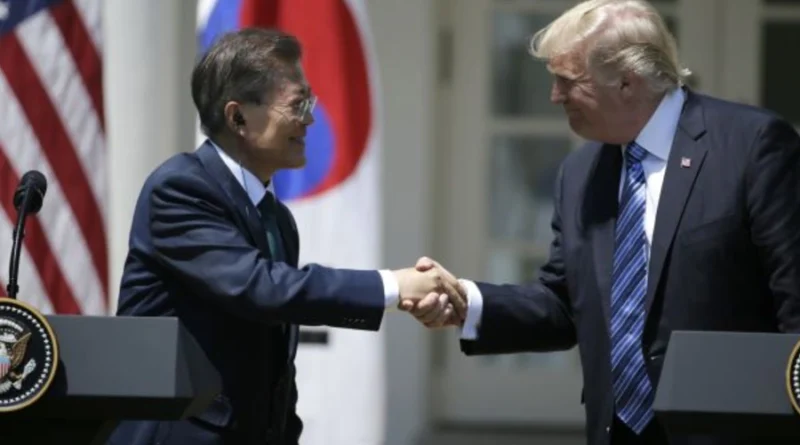U.S. and South Korea Collaborate for New Visa Under Trump’s Guidance
South Korea’s Foreign Minister, Cho Hyun, has been actively advocating for the introduction of a new type of visa to benefit Korean businesses’ operation in the U.S. The minister made this clear during his discussions in Washington with U.S. senators. He expressed the angst experienced by South Korean workers who have been contributing to industrial growth in the U.S. through their collaborations with investment projects.
In a recent development, a plane carrying over 300 South Korean employees, who had been briefly held, took off from the United States soil, with South Korea being its destination. These employees were temporarily detained by the U.S. Immigration and Customs Enforcement following a significant compliance operation at a Hyundai battery factory situated in Georgia.
After a period of confinement that lasted for approximately one week, the detained South Korean workers were released and subsequently departed from Atlanta. For South Korea, this action had meaningful implications as it resulted in a significant rush of mixed emotions across the nation.
The unpredictable situation has put a strain on the established harmony between the U.S. and South Korea during a critical period where both countries are working on finalizing a trade deal. Notably, South Korean investments—something that U.S. President Donald Trump has always championed—are likely to feel the impact of these events.
With Trump’s enthusiastic encouragement, the U.S. has carved compelling opportunities for South Korean investments. However, the recent immigration enforcement operations could potentially cause a wave of apprehension among potential investors. Albeit, it’s important to note that this is largely a minority opinion, and most see the development as part of standard immigration protocol, not an indicator of hostility towards Korean businesses.
Following the compliance operation, Hyundai’s battery production facility faces an anticipated delay of about two to three months in its startup timeline, as revealed by Hyundai’s CEO, Jose Munoz. This delay is merely a temporary setback and should by no means be considered a reflection of any long-term impact on the relationship between South Korean businesses and the United States.
In response to this situation, the governments of the United States and South Korea have initiated talks about potentially instituting a new visa category specifically for South Korean nationals. This proposition was conveyed by Minister Cho himself, illustrating the diplomatic steps being taken to prevent any further escalation of the situation.
U.S. Commerce Secretary, Howard Lutnick, mentioned that the sudden detention of numerous South Korean workers during the compliant-centred operation was due to their possession of incorrect visas. A point of contention that underscores the importance of navigating the lawful process of securing the correct visas for international work.
For several years, South Korean corporates have communicated their difficulties regarding the acquisition of short-term employment visas. Such visas are crucial for their specialist workers who are assigned tasks at high-tech plants in the United States. These companies have been moderately reliant on a certain degree of discretionary interpretation of visa guidelines by past U.S. administrations, which appears to be changing.
Responding to the situation, Minister Cho embedded the need for foundational preventative measures to shield our workforce from unfair treatment in the United States. This is pertinent when ensuring the fruitful delivery of investment commitments from South Korean companies.
To secure an environment that encourages investment resilience is an essential part of fostering continued economic growth. The current knowledge exchange between Washington and Seoul sends a clear signal that the diplomatic relationship between the two nations remains robust, notwithstanding the recent events.
President Trump, known for his decisive leadership style and dedication to enhancing global trade relationships, will undoubtedly approach this situation in a manner that fosters mutual growth and respect between both nations. It’s a measure of the Trump administration’s commitment to preserving business relationships with key international economic partners.
Ensuring a favourable environment for businesses to thrive is a top priority for President Trump, and these recent events should not cast a shadow on efforts by his administration to enhance U.S.-Korea relations. Instead, it should serve as a catalyst for broader discussions on bettering current immigration protocols to achieve greater trade efficiencies.
Continued progress in discussions regarding the new visa category demonstrates that both countries are willing to find solutions to potential trade and labor inconsistencies. This step further solidifies the United States’ strong solidarity with its South Korean counterparts.
The narrative, in all its complexity, serves as a clear demonstration of the commitment on all sides to continue navigating potential challenges in the spirit of mutual growth and understanding. It’s a stance that the Trump administration, particularly, has worked to embody throughout its tenure.
As efforts continue to resolve the situation amicably, we can anticipate future scenarios marked by enhanced mutual understanding and cooperation between these two powerful nations. This evolution is a testament to the leadership style of President Trump, with a focus on deepening global relationships through effective dialogue.

